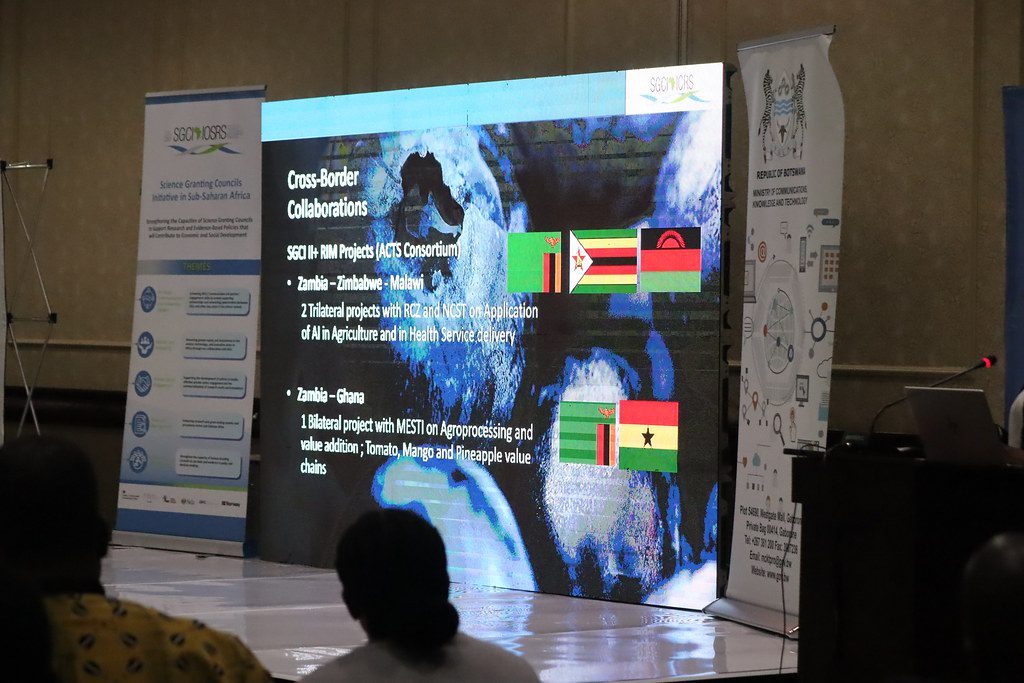SGCI News
A regional advocacy on gender equality is making slow progress in getting more women into STEM. [ACCRA] A regional advocacy programme on gender equality is helping female researchers in science,…
Gender equality is a key component of the Science Granting Councils Initiative (SGCI)
But efforts to promote gender equality in Africa continue to face hurdles
More platforms needed to highlighting work of women and girls in STEM
A regional advocacy on gender equality is making slow progress in getting more women into STEM.
[ACCRA] A regional advocacy programme on gender equality is helping female researchers in science, technology, engineering and mathematics (STEM) to access funding through the Science Granting Councils Initiative (SGCI), but hurdles remain.
Gender equality is a key component of the SGCI, which was established in 2015 to strengthen the capacities of public science funding agencies in Sub-Saharan Africa to support research and evidence-based policies to boost economic and social development.
“The motivation for the advocacy is to make women become more competitive as well as make the countries on the continent look internally to partner with each other to achieve the goals that they want,” says Tirelo Ramasedi, gender equality and inclusivity member of the Department of Research and Knowledge Business in Botswana.
The gender equality initiative aims to build the capacity of women in Sub-Saharan Africa to mainstream gender in science, technology and innovation.
Ramasedi, who attended the 2023 Gender Summit in Ghana last month (8-9 June), said Botswana had implemented a number of initiatives to increase the participation of women in science and technology and inspire the next generation of scientists, technologists and innovators.
These include a programme that pairs young women with mentors.
“This is being done at the regional level through the Southern Africa Development Community,” Ramasedi said, adding that Botswana signed the Women in Science Engineering and Technology Charter in 2022 as part of efforts to increase gender equality.
‘Off target’
Efforts to promote gender equality and inclusiveness align with Sustainable Development Goal (SDG) five, which is aimed at achieving gender equality and empowering all girls by 2030.
But Ingrid Lynch, an investigator of the SGCI project, said that data available showed African countries were behind in achieving the target.
Lynch added that efforts to address these inequalities, such as “re-entry” into school after pregnancy, is not working because only a handful of African countries have policies that support girls to continue their education after pregnancy.
“A girl who is ten years old today will see gender equality happen in secondary schools in Kenya when she is 100 years old,” Lynch said. “For those in Burkina Faso and Senegal, it will never happen in their lifetime.”
Women represent a third of researchers in sub-Saharan Africa and only a third of countries in the region have data on gender equality, added Lynch, chief research specialist at South Africa’s Human Sciences Research Council.
She called for “targeted intervention to resource women researchers through funding to increase their competitiveness as well as training funders”.
The SGCI is being implemented in countries across Sub-Saharan Africa, including Botswana, Kenya, Ghana and Tanzania.
It has financial support from the UK’s Foreign, Commonwealth and Development Office, the International Development Research Centre in Canada, South Africa’s National Research Foundation, the Swedish International Development Cooperation Agency, the German Research Foundation, and the Norwegian Agency for Development Cooperation.
Adelaide Asantewaa Asante, chief operating officer of the African Institute for Mathematical Sciences in Ghana, said that regional advocacy on gender equality had not been felt much in Ghana.
Asante added that there was a need to innovate, advance and sustain scientific gains through the role of women and girls in science.
She explained that most science concepts taught in schools focused on male figures.
“Despite making up half of the world’s population, women are underrepresented in STEM fields.” Asante said.
“There are still gender disparities that persist in both education and employment opportunities.”
Asante believes there are insufficient platforms for collaboration for Ghanaian women in science and this is impeding progress towards SDG five.
She says more platforms are needed to highlight the work of women in science, especially those with disabilities.
This work was carried out with the aid of a grant from the International Development Research Centre, Ottawa, Canada. The views expressed herein do not necessarily represent those of IDRC or its Board of Governors.
Related News
How Zambia’s science council is funding research that matters
When Zambia’s National Science and Technology Council (NSTC) was established in 1997, its founding vision was to harness science, technology, and innovation to improve the lives of ordinary Zambians. More than two decades later, that vision is increasingly taking shape through a growing portfolio of…
Voices of SGCI: Council leaders on the direction and ambition of SGCI 3
At the African Union’s Science, Technology and Innovation Week in Addis Ababa, earlier this month, leaders of science granting councils reflected on what SGCI Phase 3 represents for Africa’s science and innovation systems. From ownership and alignment to stewardship and sustainability, here are their voices…
Building Africa’s science future: inside the SGCI alliance
As Phase 3 of the Science Granting Councils Initiative launches on the margins of the African Union Summit in Addis Ababa last week, the SGCI Alliance Chair explains why this moment marks a decisive turning point for African science. Cephas Adjei Mensah describes what is…
SGCI funded projects
Rwanda’s integrated approach to sustainable agriculture and nutrition
Project Titles & Institution Areas of Research Number of Projects being funded Project Duration Grant Amount In-Kind Distribution Council Collaboration with other councils





